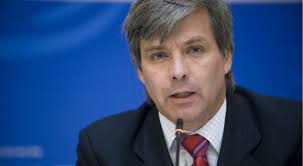By Andrew Warshaw
April 25 – Harold Mayne-Nicholls (pictured), who led the FIFA inspection team that evaluated the credentials of all 2018 and 2022 World Cup bidding candidates, has had his ban from all football-related activities reduced on appeal from seven to three years – another blow to the supposed independent judgement of FIFA’s ethics chiefs.
The Chilean was suspended in July 2015 after being found guilty of “repeatedly asking for personal favours” from the Qataris who went on to be awarded the 2022 tournament.
Mayne-Nicholls was banned after an email exchange came to light requesting possible work placements for his son and a nephew at the famed Aspire youth academy in Doha. Aspire was strongly linked to Qatar’s successful bid and FIFA’s ethics judging chamber took the view that Mayne-Nicholls had seriously violated his responsibilities.
Mayne-Nicholls, who ended up giving Qatar the worst ranking of all the candidates for the 2022 World Cup saying it was a “high risk” option, felt he had been harshly treated and FIFA’s appeals committee agreed with him.
Delivering its verdict, the committee explained: “While agreeing with the principles and arguments presented by the adjudicatory chamber, the Appeal Committee deemed that the sanction imposed was not proportionate to the breaches committed.”
The decision will come as a huge disappointment to ethics officials who have been at pains to show their teeth and crack down on the slightest sign of wrongdoing.
Two months ago, the eight-year bans meted out to Sepp Blatter and Michel Platini were likewise reduced on appeal to six years and the latest ruling will be viewed by many as further evidence that ethics judges and FIFA appeals experts have very different interpretations of what kind of punishment fits the crime.
Ethics judges were anxious to send out a strong message that Mayne-Nicholls, as head of the technical inspection team, had a special responsibility in terms of neutrality and that anything which could potentially endanger the independent evaluation of World Cup bidders was a serious conflict of interest – not least actively asking for personal favours with those close to a bid committee, regardless of the outcome of such communication.
Mayne-Nicholls, whose fine of SFr 20,000 still stands, has been reported as indicating he will appeal further to the Court of Arbitration for Sport. Whilst his conduct was incredibly naive given the sensitivity of the World Cup bid process, he has long insisted he did not in any way benefit personally – unlike other FIFA officials banned for a similar length of time for far worse offenses.
In a separate case, FIFA’s appeals committee upheld the 10-year ban handed down last November to former Asian Football Confederation (AFC) vice-president Ganesh Thapa for “various acts of misconduct over several years”.
Thapa, who stood down last year as head of the All-Nepal Football Association, was deemed to have offered and accepted cash payments relating to the 2009 and 2011 elections for the FIFA Executive Committee. The 55-year-old remains under investigation in Nepal for allegedly embezzling millions of dollars of football development money from both FIFA and the AFC.
Contact the writer of this story at moc.l1745010377labto1745010377ofdlr1745010377owedi1745010377sni@w1745010377ahsra1745010377w.wer1745010377dna1745010377

